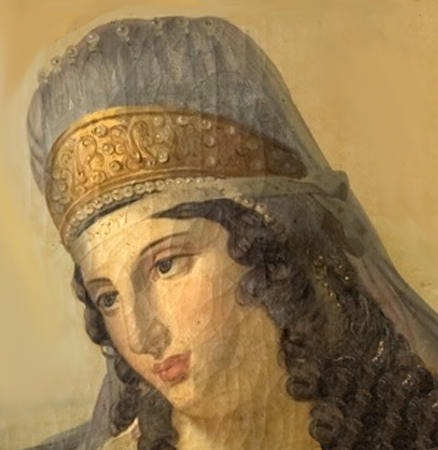
Portrait of Elissa - Detail,
P.N. Gueri, Aeneas and Dido,
Louvre Museum
Elissa founder of Carthage
Ancient Historians have long narrated in their stories about the Phoenicians, the adventurous people braving the seas in search of wealth. Their various facilities were scattered all around the Mediterranean Sea, in trading posts and at strategic locations. The Greeks and Romans, rivals of the Phoenicians and Carthaginians later on, have altered those sources and references of antiquity out of jealousy. The Phoenicians were represented as vicious and cunning merchants, attracted only by profit as motive(1).
Among the different Phoenician trading posts, a place, on the coast of North Africa, has been extremely known by its richness and independence. The city of Carthage, "Qart Hadath" (from Phoenician): The New Town, founded in 814 BC, was at the beginning, a stopover for ships laden with treasures and raw materials, on their way back from Spain.
The most famous story of the founding of this city remains that of Justin(2), narrating how Matten, King of Tyre, bequeathed the kingdom to his son Pygmalion and his daughter Elissa (Elissar - Dido). The inhabitants of Tyre, wishing a single sovereign, provoked dissension within the royal family. The gap increased especially after the marriage of Elissa to her uncle Acherbas, the high priest of Melqart, who enjoyed great authority to equal that of the king, and who had an enormous fortune. Pygmalion, impatient to appropriate the power and the wealth of his uncle, gave the order to have him assassinated, Elissa feeling threatened, decided to run away by using the ruse. In order not to raise her brother's suspicion, she expressed the desire to come and settle with him in the palace. Pygmalion accepted thinking that Elissa would bring all of her richness, He sent his vessels to bring her back to the palace.
Elissa waited for night to hide her treasures in the holds of the ship and ordered to have bags of sand prepared and placed on board. Once at sea, she threw the bags overboard, invoking the memory of her husband, imploring him to accept this offering. The king's servants were frightened to return to their sovereign and suffer the reprisals, they decided to stay with the princess and to accompany her in her journey. Several senators and some priests of the Melqart temple had joined the exile group and they all went to Cyprus to stock up with food and water. After completing the refueling, eighty virgins devoted to the temple of Astarte were kidnapped and were married to Tyrians who accompanied the princess. Elissa "The Vagrant" braved the sea and went in search of a "New City". Her ships will dock on the African coast of what is now Tunisia.
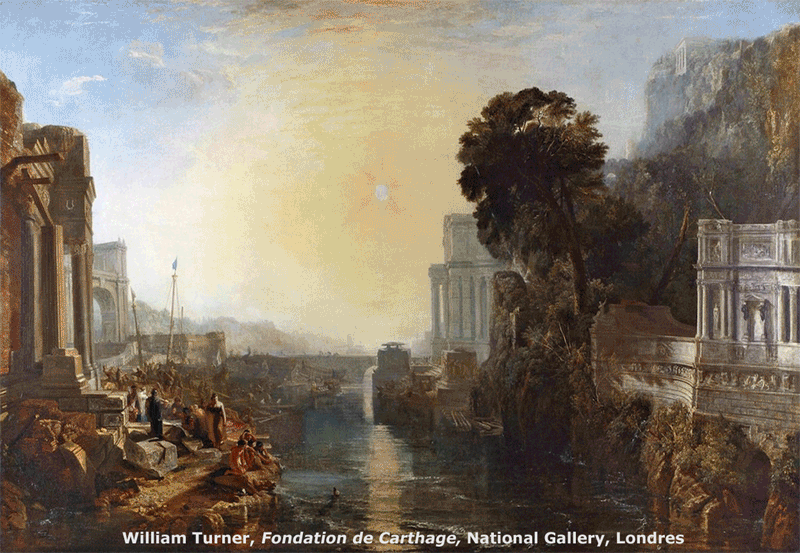
The founding of Carthage
Justin continues his story evoking the installation of the Tyrian convoy:
"Elissa, arriving in a gulf of Africa, attached the inhabitants of the coast, who rejoiced at the arrival of foreigners, and the opportunity of bartering commodities with them, to her interest. Having then bargained for a piece of ground, as much as could be covered with an ox-hide, (...), she directed the hide to be cut into the thinnest possible strips, and thus acquired a greater portion of ground than she had apparently demanded; whence the place had afterwards the name of Byrsa.
The people of the neighborhood subsequently gathering about her, bringing, in hopes of gain, many articles to the strangers for sale, and gradually fixing their abodes there, some resemblance of a city arose from the concourse. Ambassadors from the people of Utica(3), too, brought them presents as relatives, and exhorted them "to build a city where they had chanced to obtain a settlement". An inclination to detain the strangers was felt also by the Africans; and, accordingly, with the consent of all, Carthage was founded, an annual tribute being fixed for the ground which it was to occupy.
At the commencement of digging the foundations an ox's head was found, which was an omen that the city would be wealthy, indeed, but laborious and always enslaved. It was therefore removed to another place, where the head of a horse was found, which, indicating that the people would be warlike and powerful, portended an auspicious site"(4).
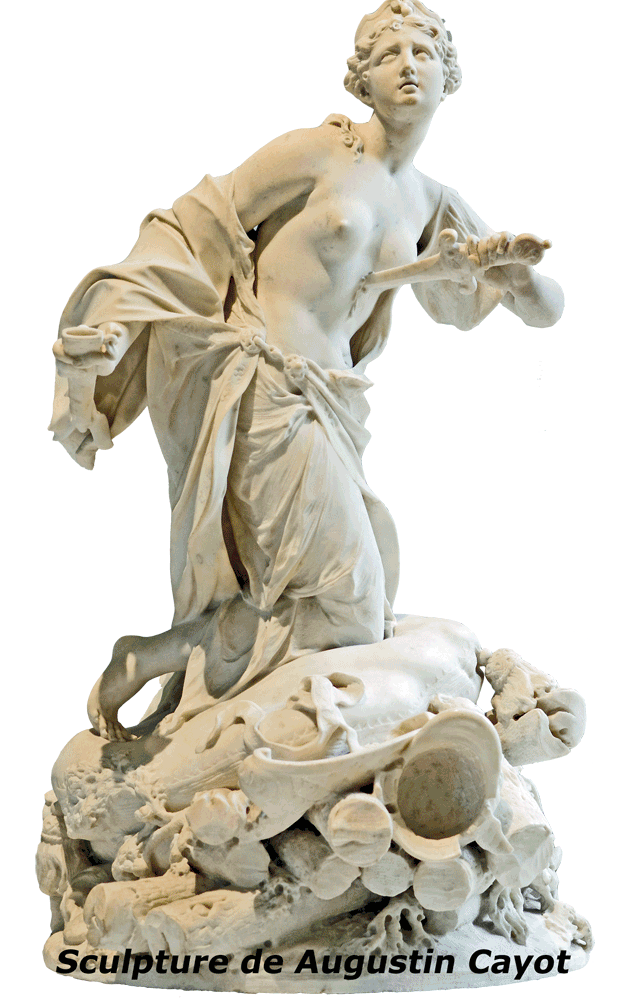
The Death of Dido
Louvre Museum
The city of Carthage prospered in the reign of Elissa, wealth grew with the arrival of new inhabitants and businesses were flourishing with merchants that flocked in from all over of the region. Hiarbas king of Maxitans the indigenous people, wanting to gain access to this new wealth, demanded Elissa's hand in marriage, otherwise he would declare war against her. The queen, refusing to betray her oath to remain faithful to the memory of her deceased husband, decided to end her life and threw herself into the fire.
Another version of Elissa's death was told by Virgil in the Aeneid. He said that the queen fell in love with the Trojan prince Aeneas, who was on his way to Italy, but was repulsed by the will of the gods to the coast near Carthage. The wedding between Aeneas and Elissa supposedly took place in a grotto, after which he established himself in the city, forgetting his quest. Jupiter will not be long to remind the Trojan that he should do his duty, and continue his journey towards Italy in order to create a new city. The prince along with his companions, set sails and forsook Elissa. The queen was stricken with grief, ordered to set fire to all the matters left by Aeneas, and then she pierced her heart with a sword and fell in the flames.
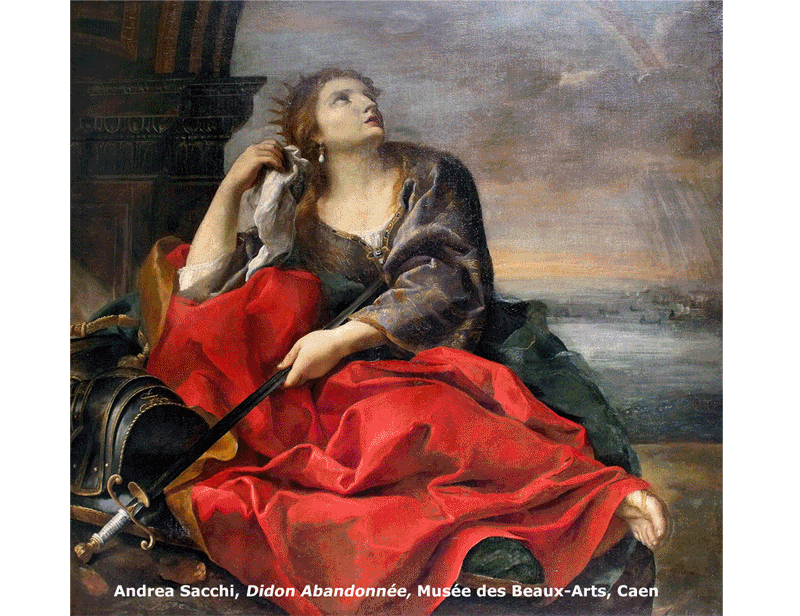
The Death of Dido
First a subject of Tyre, the city of Carthage gradually gained its independence, and was later governed by its own magistrates holding the title of suffetes. The city maintained a close relationship(5) with the mother country until the siege of Tyre by Alexander in 332 BC, when the besieged Tyrians tried to flee their city overnight, borrowing the ships heading for Carthage, where they had family and hoped to find a refuge from the war imposed on them by the Macedonians.
Carthage gradually assumed its own growth, and the inhabitants had begun to define their own commercial and diplomatic policies. Over the years they have succeeded in taking over from Tyre the guardianship of all Phoenician trading posts in the western Mediterranean. The Carthaginian dominance gave to the "Colony" a particularity that distinguished it from the "Mother City". Upon then, residents defined themselves as "Punic", thus inaugurating a new chapter in ancient history. Relationships remained on both sides, until that Mediterranean Sea became the "Mare Nostrum" of the Romans.
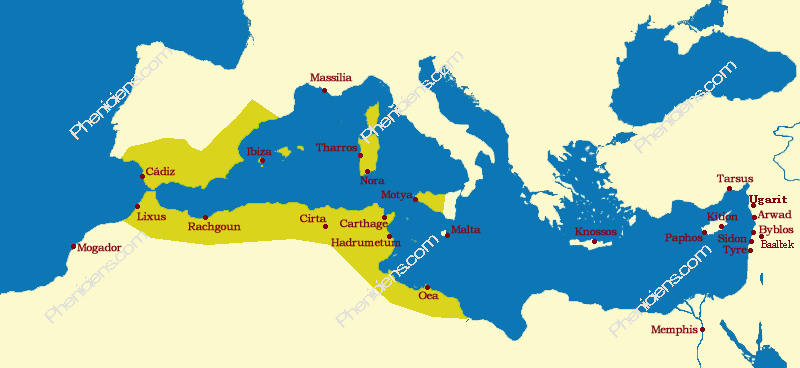
The Punic Empire
This people, descendants of the Phoenicians, have managed to create their own space as well as a divergent culture. Carthage became an empire which at the height of its glory, its influence extended from the Libyan coast to cross the Pillars of Hercules and continue all along the coast of the Atlantic Ocean: Portugal to the North, and Morocco to the South. Carthage had conquered Spain and the majority of the Mediterranean islands (Sicily, Sardinia, Corsica ...). Its army, headed by Hannibal Barca, crossed the Alps, and had come to defy Rome in front of its own gates ...(6).
| (1) |
Homère, L'Odyssée, voir la page Sidonienne. |
Retour texte |
| (2) |
Cf., Justin, XVII, 4-6 |
Retour texte |
| (3) |
Un autre comptoir phénicien créé par es marins de Tyr en 1100 av. à une trentaine de km au nord de Carthage. |
Retour texte |
| (4) |
Id, XVIII, 5, 8 sq. |
Retour texte |
| (5) |
Les Carthaginois entretenaient des liens religieux étroits avec Tyr. Ils offraient chaque année le dixième de leur revenu au temple de Melqart. |
Retour texte |
| (6) |
Nous revenons prochainement dans d’autres pages sur les Guerres Puniques et l’histoire militaire des Carthaginois et en particulier celle d’Hannibal Barca. |
Retour texte |




